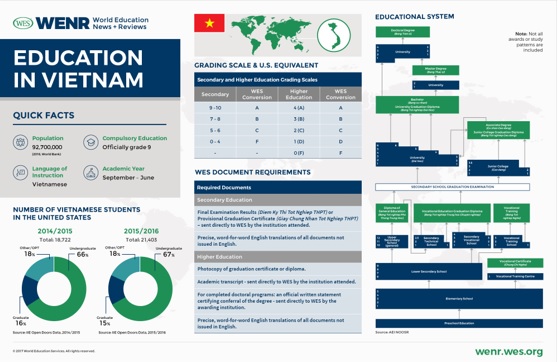Are Foreign Language Centres Hiring Unqualified Teachers?
13th June 2023

Research reveals that only 69% of the English teachers in Vietnam meet the standards of foreign language capability as set by the education ministry.
The language centers of Vietnam often promise the students and families that they will be taught by native English speakers. This is because parents believe that their children can only learn and improve their English skills if they are taught by native speakers. However, native English countries can only produce a limited number of qualified teachers. And education experts have recently highlighted the concern that to satisfy the demands of Vietnamese parents, language centers hire English teachers based on their token white face. Read on to learn the issues with ESL teaching in Vietnam and how they can be countered for a better learning environment.
Why Is The Quality Of ESL Teaching In Vietnam Degrading?
All language centers in Vietnam used to seek native English speakers who can speak unbroken and fluent English. This insistence ensured that students were taught proper English in strengthening their speaking, writing, pronunciation, and spelling skills along with making them able to create correct sentence structure.

Source: wenr.wes.org
However, over time the situation changed and teachers are being hired from every corner of the world in Vietnam. This drift from hiring quality teachers has led to the invasion of people from Europe, Africa, Spain, France, etc and certified native English speakers are becoming a minority.
This issue of unqualified or underqualified teachers in Vietnam's language centers is a concerning problem that can have a negative impact on the quality of education and the learning experience of students.
Here's an overview of some of the problems:
1. Rapid Growth and Demand
Vietnam has experienced significant economic growth over the past decades, leading to a surge in demand for English education. The rapid expansion of the ESL industry has outpaced the supply of qualified teachers, resulting in a scarcity of competent professionals.
This scarcity has forced institutions to hire underqualified and inexperienced teachers, compromising the quality of education provided to students.
2. Lack Of Proper Qualifications
One of the main problems is the presence of teachers who may not possess the necessary qualifications and expertise in teaching language skills effectively.
This can lead to ineffective teaching methods, poor classroom management, and limited ability to address students' individual needs.
3. Inadequate Teacher Training
The shortage of qualified ESL teachers in Vietnam has resulted in insufficient training opportunities for those entering the profession. Many educators lack proper pedagogical training and are ill-equipped to effectively teach English as a foreign language.
Limited access to professional development programs and a lack of standardized training requirements contribute to the degradation of ESL teaching.
4. Quality Of Education Compromised
Unqualified teachers may lack the necessary language proficiency, teaching strategies, and understanding of language acquisition principles.
As a result, students may not receive the quality education they expect and deserve, hindering their progress and ability to achieve fluency.
5. Language Policy and Cultural Barriers
Vietnamese is the primary language spoken in Vietnam, and English is often viewed as a foreign language with limited practical application. This perception, combined with a lack of emphasis on English proficiency in national education policies, contributes to reduced motivation among students to excel in English.
Additionally, cultural differences and a lack of exposure to authentic English language environments impede students' progress in acquiring English language skills.
Potential Solutions That Can Be Taken To Improve The Condition
It is quite evident that the Ministry of Labor in Vietnam will want to bring an end to the massive invasion of no qualified teachers. However, there is a disparity between supply and demand leading to teacher shortages. In such cases, it becomes detrimental for the government to make the current situation better so that students can rely on good English skills.
Here are some steps that can be taken:
- Improved Teacher Qualification Standards
The Vietnamese government can establish stricter requirements for teachers working in language centers. This could include mandatory teaching certifications, language proficiency tests, and educational degrees in language-related fields.
- Teacher Training And Development Programs
Language centers can invest in comprehensive training and professional development programs for their teachers. These programs should focus on effective teaching methodologies, classroom management techniques, and strategies to address individual student needs.
- Regular Teacher Evaluations
Implementing a system of regular evaluations can help identify and address any shortcomings in teaching quality. This can include classroom observations, student feedback, and assessments of teaching materials and methodologies.
- Collaboration With Reputable Institutions
Language centers can establish partnerships with reputable educational institutions or language organizations to ensure a higher standard of teaching. These partnerships can involve shared resources, teacher exchanges, and collaboration on curriculum development.
- Increased Awareness And Transparency
Parents and students should be encouraged to research and inquire about the qualifications of teachers before enrolling in a language center. Language centers can enhance transparency by providing detailed information about their teachers' qualifications and experience.
Attract Quality Teachers
The degradation of ESL teaching in Vietnam stems from a complex interplay of factors. To reverse the degradation of ESL teaching in Vietnam, it is crucial to invest in comprehensive teacher training programs and foster a language policy that promotes English proficiency. For starters, education leaders can offer fast-track TEFL certificate courses to their already-hired teachers. These collective efforts can Vietnam enhance its ESL education system and provide students with the language skills necessary for success in the globalized world.
Find the right course for you and try out the course. WhatsApp us at +1-213-233-9490. You can also mail us at act@asiancollegeofteachers.com.